SUMMARY
This is AI generated summarization, which may have errors. For context, always refer to the full article.
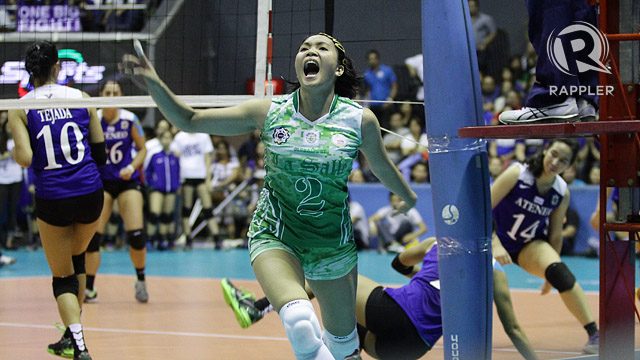
Nearly 11 years ago, I first watched the pilot episode of a TV series I would end up loving: “One Tree Hill.”
During the debut episode, one of the show’s main characters, Coach Whitey Durham, stated a line while together with Lucas Scott in an empty basketball gym. It’s a line that until today I remember flawlessly: “Nice, isn’t it? A lot of people like their gyms loud. I like mine like this: quiet, clean, kind of like a church.”
On Tuesday, April 8, 2014, the De La Salle Green Archers gym felt like a church. It was early in the morning – sometime around 9 am. No, the sound of sneakers scratching the wooden floor wasn’t echoing throughout the arena. There were no referees blowing their whistles, calling for a foul or warning one team that it was match point. No point guard bringing up the ball calling the next play from the offensive playbook. No blocker awaiting a powerful spike from her opponent, ready to unleash a deadly counter attack to turn the tide of the game.
The famous Green Archers gym, holding the jerseys of retired former DLSU greats up its rafters, along with the numerous championships of the university’s most memorable teams, was as quiet as a church on Sunday service.
And then moments later, a figure entered the vicinity – someone who DLSU students know by name, and adore by heart. Someone who sacrificed blood, sweat, and tears for the university she loves. Someone who will go down in the history books of DLSU sports, someone whose jersey may one day hang along with “Ritualo,” “Santos,” “Bachmann,” and “Lim Eng Beng.”
Abigail Marano.
On that Tuesday, I received an amazing opportunity – the chance to get to know Aby Marano. No, I’m not talking about just the superstar who changed the way La Salle’s opponents played in the UAAP.
I got the privilege to learn about where she came from, and how she grew to be arguably the most polarizing figure in the collegiate sports scene this past season. Who were her inspirations? What drove her to become the MVP she turned out to be? What made her strive for more excellence after already reaching so many accomplishments? How did she deal with the pain of losing and other factors that bothered her off the court? And what’s next for the superstar that will forever be remembered in the history books of the country’s sports fables?
Ladies and gentlemen, without further ado, I present Aby Marano: The Tale of a Champion.
The Early Years
Who would have thought that the best college volleyball player of the last five years commenced her journey after she was forced to play volleyball?
Well, with Aby Marano, two-time UAAP MVP and three-time champion, that was the case.
“Summer before ako mag-first year high school, yung mga childhood friends ko sa Antipolo, back then, they’re already players from their different high schools,” (The summer before my first year of high school, my childhood friends in Antipolo, they were already [volleyball] players from their different high schools) stated Marano during the morning of our interview.
The UAAP year was over for weeks, and the volleyball team’s captain had her academic responsibilities to take care of since it was the school’s finals week, or, as some students would like to pen it, “Hell Week.” Though, despite her busy schedule, Marano still made sure to sneak in a workout, which she planned to accomplish following our session.
Sporting Nike exercise gear, the fearsome blocker looked as in-shape as ever. Obviously, Marano made it a priority to stay in game form despite the end of her collegiate playing tenure.
“Kasi dati, puro patintero, mga tumbang preso, taguan, ganyan-ganyan mga laro namin. Yung mga childhood friends ko nag-mature na, so medyo bago na yung laro, edi wala akong magagawa kasi yun ang gusto nila laruin,” Marano laughed, while remembering how she first got into the sport she would end up dedicating most of her life to. (Before, it was patintero, tumbang preso, hide-and-seek – those were our games. My childhood friends, they matured, so our games changed. I couldn’t do anything about it)
“They taught me dig pass, spiking and all that.”
Often times, young girls have been overshadowed by their male counterparts in the field of sports, due to the latter’s ability to develop athletic tendencies at an earlier age. But unsurprisingly, Marano was an exception. As a matter of fact, Aby’s passion, which has bolstered many of her schoolmates and angered rivals, stemmed from blocking a male during an exhibition match when she was young.
“First ko talaga natutunan is yung blocking. Yung una kong na-block is lalaki, so dun talaga nag-start yung passion ko, na kaya ko pala tumalo ng lalaki,” (The first thing I learned was blocking. The first person I blocked was a guy, so my passion started there when I knew I could beat a guy) she said gleefully, as if the moment transpired just yesterday.
Having a newfound appreciation for the game, the young standout tried her luck at her school’s varsity try-outs. It’s not common for first years to make Team A, but given Marano’s talent, passion, and determination, there was no question she deserved to be in the lineup. She made it to the team, and her journey had officially started.
“First year high school, kinuha ako nung coach namin sa DAZMA (Don Antonio De Zuzuarregui Sr. Memorial Academy). Duon na talaga yung proper training na volleyball na spiking, tamang approach, tamang everything,” (First year high school, the coach at DAZMA let me in the team. That was when I started proper training – spiking, the right approach, the right everything) she shared, before talking about how it was at that time when she first experienced the tragic feeling of losing.
“First year, we fought for the league Milo Best, so yun yung unang talo namin, tapos sobrang sakit. Dun ko unang na-feel yung sakit nang pagkatalo,” (In first year, we fought for the league Milo Best. That was when we first loss, and it hurt badly. That was when I first experienced the suffering cost by losing) mentioned El Capitana.
Unfortunately for Marano, coming up short at that Milo Best tournament wouldn’t be the first time she would go through the devastation of losing. It did, nevertheless, motivate her to enhance her game, paving the way for a legendary career.
DAZMA’s Milo Best stint in Marano’s first high school tour of duty ended up in disappointment, but it led to the development of Aby’s playmaking on the court, and her leadership off it. In her sophomore year, the young girl who was crying a few months prior following her first feeling of defeat was now the captain of her squad, and had vengeance in mind.
“Second year, naging team captain kaagad ako ng team ko kasi sobrang passionate ako. As in naadik ako sa volleyball,” (In second year, I became team captain because I had so much passion. I mean, I was so addicted to volleyball) recalled Marano, who would go on to lead her school to multiple victories. “Yung gusto ko sa volleyball, yung feeling na kasama teammates mo, may sisterhood, parang family talaga.” (What I like about volleyball is the feeling of being with your teammates – there’s a sisterhood, like a family)
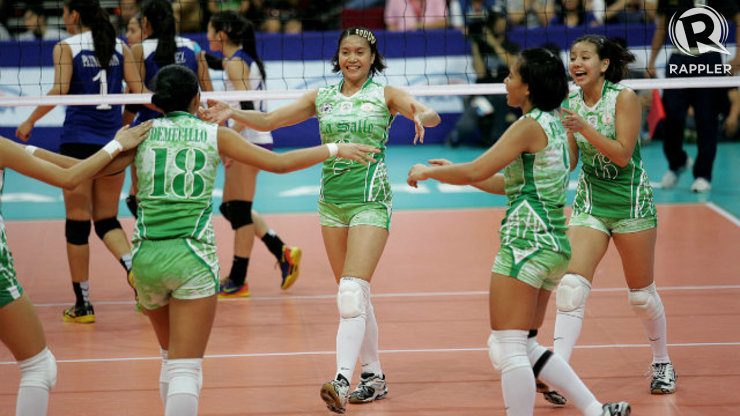
Everything was great. As each day passed, Marano’s skill improved, and the bond between the captain and her teammates grew stronger with each set they practiced. Scouts were beginning to hear about Marano, and volleyball became one of the most, if not the most, integral parts of her life. But for all the success and joy she got from spending time with her comrades playing the game they love, a certain important person was beginning to grow against the thought of Aby’s dedication to the sport.
Her mother.
“Ang dami kong ginagawa noon sa school, hanggang, yun, nagalit mommy ko,” (I was involved in so much school-related activities to a point that my mom got mad) the five-year veteran remembered. “Pinapastop niya ako sa volleyball. Gusto niya mag-studies muna ako. So ang ginagawa ko, nagtatago ako ng jerseys and pang-training sa ilalim ng books sa backpack ko. Uuwi ako ng gabi, sasabihin ko may meeting kami sa school tungkol sa mga activities namin,” (She made me stop playing volleyball. She wanted me to concentrate on studies. So what I did, I hid my jerseys and training gear under the books in my backpack. Whenever I would come home late, I used to reason that I had academic-related activities) Marano said laughingly, while looking back at her mischievous adventures.
But for as good as Marano was at plotting, she could only last so long until the person who knew her best would eventually catch up to her antics – with some help from the local papers.
“Eventually nalaman niya kasi lumabas sa newspaper nang Antipolo yung pangalan at picture ko. Tapos nagtataka si mama kung bakit ang dami niyang friends na nagtatanong kung kilala raw ako.” (Eventually, she found out because a newspaper that released in Antipolo had my name and picture. Then, she started to wonder why so many of her friends asked if I was known)
The often-cheerful Marano suddenly turned serious during our interview. Closing her eyes and falling quiet, she tried to remember the exact details of the event that would go on to alter the course of her volleyball career.
What she said after turned out to be one of the most emotional moments of her life.
“Di siya aware na nagcocompete ako until one time nanood siya. Dun siya nagulat na magaling pala anak niya, na hindi pala laro-laro ang volleyball,” stated Marano, the emotion oozing in her voice. (She wasn’t aware that I competed until she watched me in one of my games. That was when she got shocked that her child was actually good. Moreover, she found out that volleyball wasn’t just a game)
“Sabi ko rin sa kanya, siya yung mom na di sumusupport sa anak niya. Nasaktan daw siya dun kasi sobrang emotional ko rin and nakikita ko yung teammates ko, nandun families nila. Eh ako yung team captain, tapos wala, sobrang sakit sa puso. Tapos yun, after makanood ng game, na-attached na rin siya sa volleyball because of me.”
(I also told her that she was the lone mom who wasn’t supporting her child. She got hurt because I also got emotional and I used to see the families of my teammates supporting their children. I was the captain and my mom wasn’t there – it was really painful. But then after she watched the game, she also got attached to volleyball because of me)
Crisis averted. Rather than her young volleyball career coming to a halt following her mother’s discovery, Marano instead got the support of her parent, and could now concentrate on improving her abilities on the hardcourt rather than worrying about other distractions, as long as she kept her grades up, which she did with flying colors.
Simultaneously, her game kept rapidly improving, and word about her started to spread. She gained so much traction in the volleyball community that she received a visit from a man who would one day change her life.
Coach Ramil De Jesus.
Enter La Salle.
Recruitment
As her skills sharpened and her legend spread, college coaches began to take notice of Marano. This became most evident when on one certain day, she got to meet the person who would one day become her mentor, guide, and father figure.
“Akala ni Coach [De Jesus] graduating na ako, (Coach De Jesus thought I was graduating already)” said Marano about the day she got acquainted with the DLSU mentor. “Ang ginawa ng La Salle, babalikan daw [ako].” (La Salle said they would come back for me)
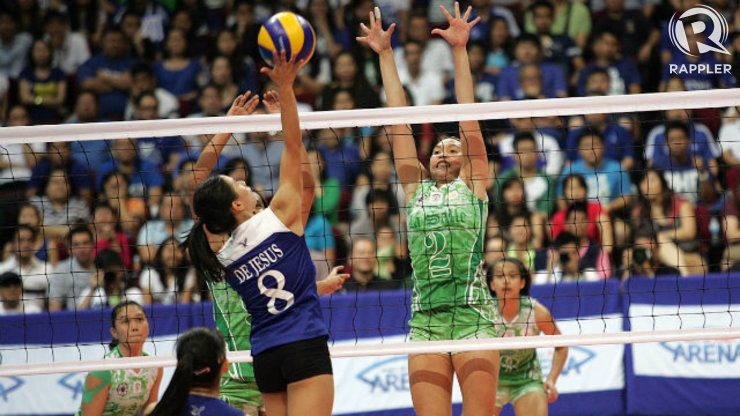
The plan was simple: wait for Marano to play out the rest of her high school career, graduate, and then don the green-and-white colors of the prestigious university located in the heart of Vito Cruz, Taft, Manila. Coach De Jesus and his staff were pleased. Having already won five championships, the silent but genius play-caller knew that incorporating a prospect with as much talent as Aby could lead to many more titles and a potential dynasty.
But what he didn’t know was that a prospective roadblock got in the way. Something that, had it pushed through, could have led to a shift in how the past five years had transpired for DLSU volleyball.
“May senior ako dati na player na ng San Sebastian. Gusto niya ako to join their team,” (I had a senior teammate who was bound to play for San Sebastian. She wanted me to join the team), noted Marano, who later admitted that, at that time, she had yet to grasp the importance of picking a college beyond the realms of its athletic program.
“Siyempre ako, bata, di ko pa alam yung difference ng San Sebastian, La Salle, Ateneo, Adamson, UST. So ayun, third year pa lang nagtraining na ako sa San Sebastian until fourth year.” (I was a kid, and I didn’t know the difference between San Sebastian, La Salle, Ateneo, Adamson, UST. Until my fourth year, I was training at San Sebastian)
Just think about it for a second. Had Marano elected to play for Baste, how many finals appearances would DLSU have reached without its vocal leader? Furthermore, where would the UAAP be without the girl who was a driving force in elevating the game of college volleyball in the country over the past year?
Fortunately enough, DLSU had gotten word about Aby’s practices at San Sebastian, and was quick to act upon learning that their prize recruit was about to be taken by another college – albeit one that competes in another league.
“Fourth year, bumalik yung La Salle kasi nalaman raw nila na nagtraining na ako sa San Sebastian. Yung process ng La Salle na recruit, they went to our house first,” (In fourth year, La Salle returned because they learned about my training sessions in San Sebastian. First and foremost, they visited my home),” shared Marano, who couldn’t put into words how much DLSU’s efforts meant to her. “After sa bahay, pumunta sila sa school. Kinausap nila yung coach ko, yung principal, ako, tapos yung discipline officer.” (After my house, they went to my school. They talked to my coach, my principal, me, and then my discipline officer)
San Sebastian, though, didn’t give up without a fight and also tried its best to attain the services of the future superstar, who was deep in contemplation regarding where she believed her future was meant to be. The decision wasn’t easy, and the thought process preceding it was a taxing venture.
Marano wanted to be with her teammates, most of whom were bound for Baste. Though, she also wanted to start her own adventure – an option that was waiting for her at the storied campus of De La Salle. She turned to others for their opinions – some backed one school, others opted for the second option. Players who were already suiting up for each university and its alumni also went out of their way to make her feel welcome, let her know what she can expect while in college, and what to expect the moment she graduates.
Eventually, her choice was determined by what she felt was a responsibility to her parents. The highly coveted star chose to go to DLSU, where she felt she could earn the education that would yield her a variety of opportunities following her college-playing career.
“Gusto ko kasi maibalik lahat ng pinaghirapan ni mama na pagdating ng panahon, ako naman magtatrabaho. And paano ko makukuha yun? Syempre, pag sinabing, ‘La salle,’ parang yan standard ng mga companies.” (I wanted to return to my mom all the hard work she had gone through for me by working a great job myself when the time comes. And how would I achieve that? Of course, when you say, “La Salle,” that’s like a standard for companies.)
“Kinuha ko na rin na step yun to achieving my future.” (I also looked as it as a stepping-stone to achieving a bright future).
By no means was accepting La Salle’s offer an easy choice. Marano, a star student in high school both for academics and extra-curricular activities, had relinquished the opportunity to play college volleyball with her pre-college teammates who looked up to her as their team captain. She did this in order to start a new adventure in a place filled with uncertainty and tough challenges. She didn’t know what to expect.
What she was aware of, however, was that she was about to represent DLSU in the UAAP, earn an education some can only dream of, and play for one of the most respected coaches in the country.
The next chapter of her story was just being written.
The early years and transitioning to being Team Captain
Like her first year in high school, Marano’s first go in the collegiate ranks ended in heartbreak. After storming to a 13-1 elimination round campaign, the De La Salle Lady Spikers fell at the hands of the UST Tigresses, 2-0, in the finals of Season 72.
For someone as passionate and dedicated to winning as Aby, accepting defeat after a dominant pre-playoffs campaign was hard to muster. Up to today the fearsome blocker, who at that time was just a rookie, still wonders what went wrong as the Lady Spikers yielded to their rivals from Espana.
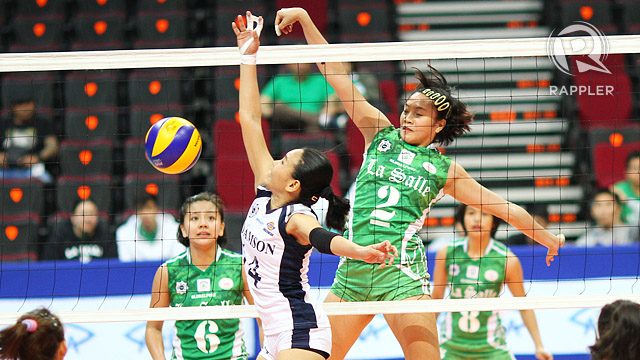
Nevertheless, one season later, DLSU uncorked another 13-1 elimination round campaign, and then finished the job they failed to accomplish a year before by sweeping UST in the finals to claim its sixth volleyball title in the UAAP. Led by the likes of Marano, Finals MVP Cha Cruz, Michelle Gumabao, Stephanie Mercado, Jacqueline Alarca, and others, the Ramil De Jesus-coached team began its reign atop the college volleyball scene.
And it didn’t stop there. In Season 74, Marano elevated her game to epic proportions and was crowned her first MVP award, leading the Taft-based volleybelles to a perfect 14-0 record. In the finals, they faced rival Ateneo, beating them in three games to claim a second straight championship.
Aby, once upon a time a kid who just wanted to play a game of patintero, was beginning her ascent as the country’s best college volleyball player. Everything was going picture-perfect. The wins were accumulating, the praise from the media increasing, and the adoration from the DLSU community was bottomless – moreover since the university’s basketball team was underperforming under the tutelage of Coach Dindo Pumaren.
Lasallians loved their volleyball squad because they played like a team that seemed to be unbeatable. And for a lot of instances, they were just that. They were a team that brought pride and glory to their university. But not many realize that behind the scenes, a lot of events took place that affected the squad and its captain.
Under the spotlight of superstardom, Marano constantly reminded herself to remain humble. And most of all, she reminded herself that the plums of individual success would never outdo the recognition brought about by team play. After all, volleyball is a sport won by a collection of individuals thriving as one collective unit.
“Hindi ako naglalaro to get the [individual] award; naglalaro ako to get the championship,” (I don’t play for individual awards, I play for the championship) Marano answered when I asked her what she used to tell herself during the days when her individual brilliance started to get the attention of the country.
“Kasi pag sinaksak mo sa utak mo na MVP ka, ikaw na yung team captain, ang galing mo… wala na. Stuck na lang ako dun.” (Because the moment you start entertaining thoughts that you’re the MVP, the team captain, and that you’re so good, then you’re going to get stuck)
Furthermore, El Capitana’s responsibilities expanded from just on the court. Besides being the driving force of Coach De Jesus’ offensive and defensive playbooks, he also asked her to take responsibility of the team off the playing field by being its captain. Marano, who called herself “yung sobrang makulit sa team” (the most playful roster member), now had the task of guiding and uniting a group in search of another championship.
Succeed, and La Salle enters its name in the UAAP history books by being one of the limited members to win three straight titles. Fail, and the dynasty comes to an end.
In due course, Marano triumphed in her duties as captain. But it didn’t come easy. While her comrades transitioned to her teachings, she also had to learn on the fly – how to be more patient, open, and most of all, meeting the heightened expectations of her coach.
It’s not easy to please Coach De Jesus. He is after all a nine-time champion, so saying he requires respect and greatness from his players would be putting it nicely. He is kind, and a father figure to the girls in his roster. But he also commands them to give nothing more than 100% heart, will, and effort in every practice and game.
And sometimes, he can push his star players to the limit. Until today, such an incident stands out with Marano, who says she will never forget the said moment.
During one practice session, Coach De Jesus was unhappy with the demeanor of his girls. Marano, being the captain of the team, got most of the criticism. Disappointed and confused, Marano headed to the locker room where her emotions took over. Feeling unjustly berated, Aby found herself asking, “why me?” She was the leader of the squad, but she found herself receiving the chunk of the blame even for the mistakes caused by her teammates that didn’t involve her.
Moments later, Coach De Jesus came to console the teary-eyed Marano. But he was no longer the guy who just scolded Aby in front of her team, but rather the father-like mentor who has earned the respect of all his players despite his strict guidelines.
“‘Tiisin mo lang ako kasi gusto kita maging magaling na leader,'” (Just bear with me because I want you to be a great leader) the team captain remembered her coach telling her inside the quiet but sentiment-heavy area they were in, as if the conversation took place just minutes before our interview. Clearly, that memory has stuck by her all these years.
“Nung sinabi niya yun halos maluha-luha ako kasi may purpose pala yung ginagawa niya. Nawala lahat ng sakit, pagalit, at tama naman siya, kaya mas namotivate ako to become a better person inside and out the court.”
(When he said that, I started to tear up because, after all, there was a purpose to his actions. All the hurt and anger was gone, and it turned out that he was correct, which was why I became more motivated to become a better person in and out of the court)
Needless to say, it worked.
In Aby’s first stretch as the sole team captain – she had previously shared leadership duties with Cha Cruz – in Season 75, De La Salle reigned supreme once again. Following another 13-1 elimination round campaign, Marano and company easily dispatched NU in the Final Four round, then proceeded to sweeping Ateneo for the university’s third straight volleyball title, and their eighth overall. Furthermore, the Antipolo native was given her second straight MVP award.
All the scolding, lectures, lessons, criticism, roadblocks, and challenges were all worth it. All was well.
But winning can be an addiction. And La Salle knew a four-peat was in sight. Attaining a fourth straight title would make them the first team to ever do so, and not long after spearheading her club to a third ring, Marano was already looking forward to making even more history.
The last season
2013 was a great year for DLSU sports. After years of disappointing finishes and struggles, the basketball team finally usurped Ateneo from the crown and won the championship again by beating UST. Heck, even the Animo Squad team finished in the Top 3 in the Cheerdance Competition. Meanwhile, the university’s other sports teams were achieving, too; La Salle was en route to a second straight general championship.
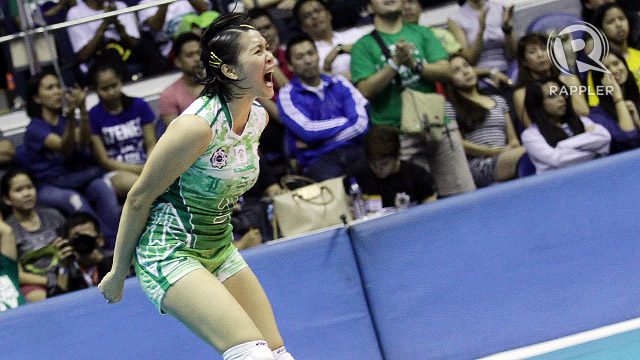
The volleyball title was supposed to be the icing on the cake. With an ensemble of battle-ready veterans, DLSU was the favorite the win the championship once again, even if the fearsome Gumabao chose to forego her final year of playing eligibility. Marano, the reigning MVP of the league, wanted the storybook ending to her college career. And what better way to accomplish that than to propel the university she grew to love to a fourth consecutive trophy.
Entering the finals, the girls in green-and-white seemed destined to be the last team standing again. What was even more impressive about them going 14-0 was that they dropped only two sets the entire elimination round. That’s a record of 42-2.
Only one team stood in their way. An opponent they had beaten twice in the finals in the last two years – a rival on a Cinderella run that promised to give La Salle the fight of their lives.
Ateneo.
“Siguro yung training ng Ateneo, parang they’re playing under happiness, na walang mawawala sa kanila. Kami, may idedefend kaming korona, andun pa rin yung pressure,” said Marano. (Ateneo, they were playing with happiness, like a team with nothing to lose. We, on the other hand, we were defending something, so the pressure was there)
The Lady Eagles, led by Thai Head Coach Tai Bundit, shocked their Taft-based rivals by beating them in Game 1, 3-1, after losing their previous six sets against the Lady Spikers. DLSU, which hadn’t seen action in almost two weeks prior to the Finals, was in unfamiliar territory – reeling from a loss.
“Kasi yung condition, nagkulang. Kasi hinihintay namin yung NU at Ateneo. Hindi kami nagpapahinga and mas mahirap yung training kesa sa laro,” shared Marano, who said that her team went full-throttle during practices rather than using their break for rest to nurse injuries. (Our endurance was lacking. While we were waiting the winner of NU-Ateneo, we weren’t rested because of training. And training is harder than the game itself)
Thanks to its thrice-to-beat-advantage, La Salle still had to lose twice before Ateneo could become champions. In Game 2, the Lady Spikers attacked back, winning in four sets to be one game away from the title.
In Game 3, the Lady Eagles raced off to an early lead, going on top two sets to none. DLSU, however, rallied to tie the contest and force a fifth set. In the deciding canto, La Salle built a 12-8 threshold, and was three more points away from victory.
Three points away from history.
Tears started to roll down the cheeks of some of DLSU’s players. The green-dominant side of the Mall of Asia Arena started to roar, ready to celebrate another championship while their blue-shirted rivals bowed heads in disappointment. DLSU students and alumni were beaming with joy, ready to tweet, “FOUR-PEAT!” for the entire world to see. Marano’s storybook ending was coming to fruition.
And then in a blink of an eye, it was all taken away. Ateneo stormed back to tie the game and take a one-point lead, 16-15, while its fans screamed their hearts out in the MOA Arena. And then, in one of the most controversial calls in the league’s history, DLSU was called for a violation that awarded the Lady Eagles the victory, setting up a pivotal Game 5.
Bewildered and at a loss for words, La Salle fans in attendance could only sit in disbelief while the Katipunan-based students sent the arena into a ruckus. Marano, angered that her dream was just taken away from her, turned her frustrations to the referee whom she felt robbed her team.
“Hindi talaga tama yung tawag na yun and ang daming tawag na mali,” (That call was incorrect and so many calls were mistakes), revolted Aby, who was clearly appalled at the decision that essentially cost her team a championship. “Paano namin machachallenge yun e walang replay? So duon pa lang siguro di pala talaga sa amin.” (How were we supposed to challenge the call when the league doesn’t have a replay system? From there, it felt as if us winning the title was not meant to be).
Though the Lady Spikers were still agonizing about Game 4, they knew they had one more chance to reach their goal. The final game, for all the marbles, was just three days away.
But it just wasn’t meant to be.
La Salle, clearly out of sync and looking nothing similar to their titan-like selves in the elimination round, got swept by the Lady Eagles in three sets in Game 5. The season was over. There would be no fourth straight championship. No party at the Henry Sy Building. No history-breaking record. And for the two-time MVP, no storybook ending to her legendary career. It was over.
While the Mall of Asia Arena showered in blue and white confetti, an emotionally hit Marano circled her team. For the last time, El Capitana would give her final message. See, she had inspired her teammates before, like a general gearing up his men for war. But this was different. She had to console her anguished teammates, while keeping her own tears in check.
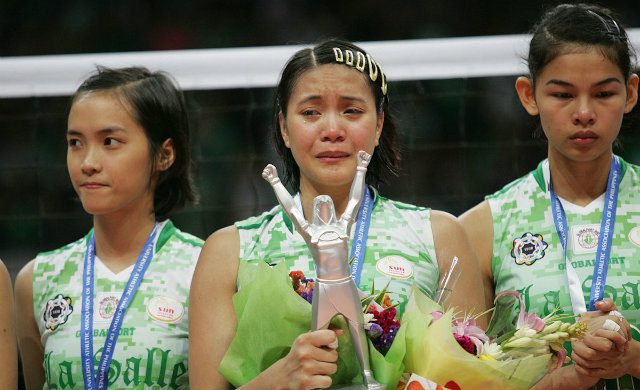
“Sabi ko, ‘Itong pagkatalo natin, hindi ito definition na mahina tayo.’ Sabi ko sa kanila, kailangan maging mas matatag sila. ‘Next year, ibabawi niyo ako. Babangon kayo.'” (I told them, this loss, it doesn’t define us as weak. I told them that they need to be better next year, when they will get to avenge me. I told them they would rise again) Marano narrated to me, while her eyes stayed shut.
When they opened again, her eyes were puffy and red, and tears started to fall down her cheeks, similar to the moment when her teammates gave her a final salute following their loss to Ateneo. It was in that moment when Marano realized how much she truly inspired her teammates. They had formed a sisterhood so strong that not even the torturous feeling of defeat could break.
Wiping her tears away, Marano continued: “Sobrang ang sakit talaga nung winning point nung Ateneo. Nakita ko yung mga bata nag-sosorry sila sa akin. This Season 76, gusto nila idedicate for me kaso di natuloy.” (Ateneo’s game-winning point was so painful. I looked at my teammates and they were all apologizing to me. This Season 76, they wanted to dedicated the victory to me, but it didn’t come to a reality).
“Si Mika Esperanza, sabi niya, ‘Ate Aby, ibabawi ka namin. Kukunin namin ulit yung korona.'” (Mika Esperanza told me, “Aby, we will avenge you. We will regain the crown.”)
“‘Para sa ‘yo.'” (“For you.”)
“‘Para sa La Salle.'” (“For La Salle.”)
La Salle may very well go on to take down Ateneo next season if both teams meet in the finals again, or it could go the other way, and the Lady Eagles may start a dynasty of their own. But whatever happens, Marano won’t be present to lead her Alma Matter. For her, the UAAP is now in the rear view.
Championship or not, it was time to move on.
What comes next
After dealing with her final examinations, Marano plans on participating in the upcoming All-Filipino Conference of the Philippine Super Liga, where she was recently selected second overall behind Dindin Santiago in its draft.

Marano will suit up for Air Asia, where she will play once again for Coach Ramil De Jesus and get to be teammates with former Lady Spikers Stephanie Mercado, Melissa Gohing, Michelle Gumabao, Wensh Tiu, and Cha Cruz. Some have penned their team as “Animo Air Asia” – a nickname Aby doesn’t mind, she says.
However, whatever happens in tomorrow years will not revolve only around volleyball, concluded Marano.
“I’m still planning to continue my Masters in Communications in Applied Media Studies,” said the A-class student who blogs in Tagalog in her spare time. She has also already received offers to work for various companies.
“I’m still deciding whether to work for Meralco na or Air Asia kasi ang daming offers. Pero sabi ni Coach Ramil, ‘You don’t have to rush.'” (I’m debating whether to work for Meralco, Air Asia, or possibly another company since there have been a lot of offers. But Coach Ramil told me I don’t need to rush my decision)
Volleyball always has been an essential part of the former MVP’s life. And though she smiles at the opportunities outside of the sport, she knows it will always be a huge part of her, which is why she may take her powerful roars, devastating blocks, and motivational words to the international stage.
“I’m planning to go RP also with Dindin Santiago to serve the country. Kasi it’s my dream din to play for the Philippines.” (I’m planning to play for the RP team with Dindin Santiago – it’s my dream to serve the country)
Regardless of what Aby’s future holds, she will always – always – have a home in De La Salle University. With her powerful screams during games, she bolstered and inspired the team’s fans into screaming boisterous cheers, while demoralizing her opponents. With her forceful spikes and blocks, she led the Lady Spikers to many wins and memorable championship runs.
With every inch of blood, sweat, and tears she devoted to her school, she may one day be fortunate enough to have her jersey retired alongside “Bachmann,” “Lim Eng Beng,” “Ritualo,” and “Santos.”
“I want the Animo I showed over the years to be remembered. Gusto kong maalala yun ng mga tao para mamotivate sila maglaro,” (I want people to remember that so that they get motivated to play), noted Marano.
She continued: “Sabi ko kay Sir Edwin (DLSU Sports Team Manager) dati, gusto ko maging legend. Sabi niya, ‘You’ll become a legend in your own way.’ Sabi ko kung di ako maging legend like Ate Illa [Santos], maging legend ako as Aby Marano. Yung maangas, at beast mode pag naglalaro. Kahit marami akong haters, okay lang.”
(I told Sir Edwin before that I wanted to be a legend. He told me, ‘You’ll become a legend in your own way.’ I told myself that if I don’t become a legend like Illa Santos, I became a legend known as Aby Marano. The kind who isn’t arrogant, but a beast inside the court, even if it meant receiving a lot of haters.)
“Siguro kung mabigay (jersey retirement) sobrang sarap ng feeling kasi ang dami kong nainvest sa volleyball,” (If I get it, the feeling will be great because I’ve invested so much in volleyball) she responded when I asked her how much her jersey being retired would mean to her.
“Pag naretire ka, yun yung sobrang, best gift sayo ng isang school bilang atleta.” (If your jersey gets retired, that would be the best gift a school can give you as an athlete)
After my interview with Marano came to a close and we said our goodbyes, she mentioned that she still planned on sneaking in a workout – the DLSU Gym was closed that day, but that wasn’t going to stop her (What could, right?). I then sat back, welcomed the ambiance of the quiet Green Archers Gym once again, and then reflected back on Coach Durham’s line to Scott about the empty gym and Church.
Scott’s reply was sardonic: “I say those people that pray here waste their time. God doesn’t watch sports.”
Maybe, maybe not. But God did give this country Abigail Palmares Marano. And we are fortunate to witness her greatness. – Rappler.com
Naveen Ganglani is a part-time businessman and a part-time sports writer who has covered collegiate sports in the Philippines for The Lasallian (DLSU’s official publication) and other major sports leagues like the NBA, NFL, and Philippine Super Liga for different outlets. A die-hard Miami Heat, New England Patriots, and DLSU sports fan, Naveen religiously follows a variety of sports both international and local, and considers sports as his first love. Follow him on Twitter: @naveenganglani
Add a comment
How does this make you feel?
There are no comments yet. Add your comment to start the conversation.